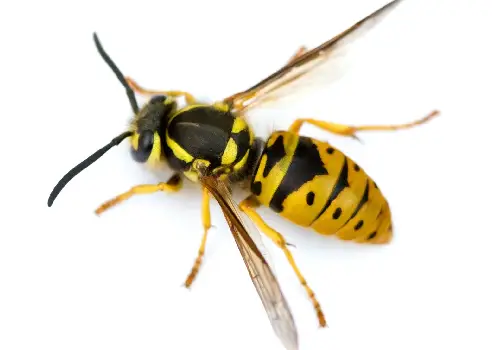
The European wasp (Vespula germanica) is one of the most common and aggressive wasp species found in Melbourne, Australia. Originally native to Europe, this species has become an invasive pest in many parts of the world due to its adaptability and aggressive behavior. These wasps are easily recognizable by their distinct yellow and black banding and are generally between 12 to 16 millimeters in length, slightly larger than native wasp species.
European wasps are highly adaptable when it comes to building their nests, which is why they thrive in urban areas like Melbourne. They favor sheltered locations such as roof cavities, wall spaces, and even underground burrows. This preference for enclosed and hidden spaces makes it difficult to locate their nests until a large number of wasps are active, sometimes leading to dangerous encounters for people who accidentally disturb them. In gardens, they may also build nests in compost heaps or dense shrubbery. The wasps use materials like wood fibers and plant matter to create their nests, which can house thousands of wasps in a single colony.
One of the most notable aspects of European wasps is their highly territorial and aggressive behavior. When they sense that their nest is under threat, they will attack in swarms, delivering multiple stings to their target. Unlike bees, European wasps can sting repeatedly without dying, which makes them especially dangerous. Their venom can cause painful stings and, in some cases, allergic reactions that require medical attention. This aggressive nature is why it is important to avoid provoking these wasps or disturbing their nests.
European wasps are particularly attracted to sweet foods and proteins, making them a common nuisance during picnics, barbecues, and outdoor dining in Melbourne. They are drawn to sugary drinks, fruit, meats, and even pet food, leading them to scavenge around humans. Their presence at outdoor gatherings can be both annoying and dangerous, as they may become aggressive if disturbed while feeding. Due to their attraction to food, they are also known to invade garbage bins and food waste areas, further increasing their interaction with people.
Managing European wasp infestations can be challenging, especially because of their aggressive nature and the hidden locations of their nests. Professional pest control services are often required to safely remove nests and reduce the risk of stings.

Honoring exceptional customer service and dedication to satisfaction.

Recognized for sustainable and environmentally friendly practices.

Awarded for providing round-the-clock emergency services to customers.

Chosen by customers for exceptional pest control services.

Honoring top industry certifications and professionalism.
No recent posts available.